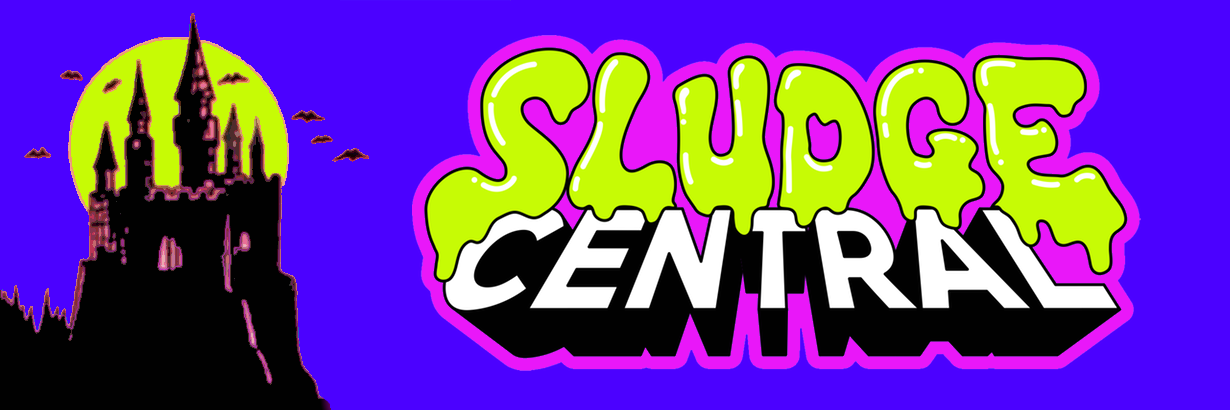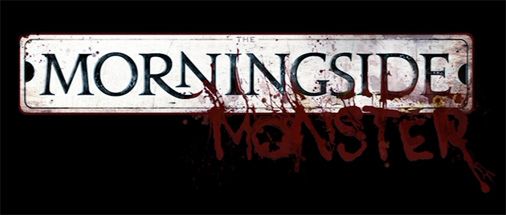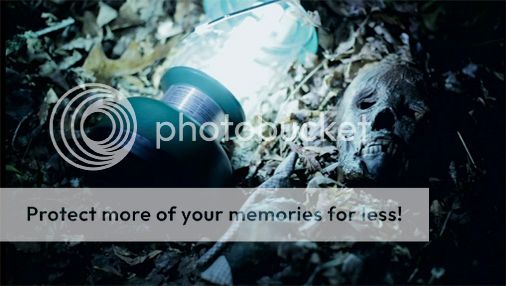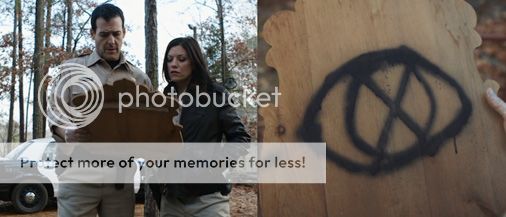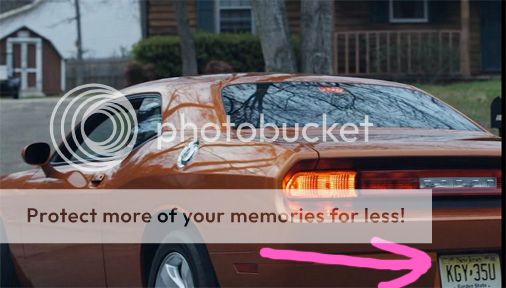First, the synopsis. Set in the fictional small town of Morningside, New Jersey, we’re immediately introduced to an ominous figure in a black hooded cape whose about to apprehensively cut someone in half with an electric blade.
After we’re acquainted with the central characters, a body is found in the woods. From there, the police force, Sheriff Tom Haulk (Robert Pralgo) and Deputy Klara Austin (Tiffany Shepis), begin to piece together what can only be described as a series of ritualistic murders in their quiet town.
What’s stumping the cops is the symbol of a crossed out eye that’s left at the scene of each murder. Deputy Austin offers that it might be a gang sign similar to those she saw during her time working in the Bronx. The killer intentionally leaves this mark at the scene of his crimes in the vein of a ’60s Batman villain, which strikes me as silly. Why would the killer go out of their way to draw attention to themselves?
With the assistance of a university professor, Sheriff Haulk deduces that the killer has stolen a rare Central American ceremonial mask and a tribal mace from their collection and the symbol is a ritualistic mark from this same tribe.
The killers mask itself is almost reminiscent of the Witch Doctor from Scooby-Doo:
The movie had its quirks, quite a few of them actually. Here’s the biggest issue: I figured out the entire plot about 15 minutes in to the film.
The film gave too much away early on. Merely seeing the glimpse into the killers “lair” from the onset reveals that they’re in some kind of basement or unfinished area of a house. What the killer is doing to their prey, (removing their body parts and putting them into a bowl), combined with other glaring details, made it easy to figure out the rest of the movie.
There’s a lot of time spent on creating dramatic scenes to divert the viewers attention when there’s really no mystery about who the killer is. If you’ve seen a decent amount of horror or mysteries, you will figured out the plot rather quickly.
More severe than the previous issues I had, is the peculiar drug angle of the film. In contrast with the bit in the summary on the back of the DVD regarding “deadly serious local drug runners,” their ring leader and his stereotypical goons are not easy to take seriously. The two street dealers who they supply are not written as if they are everyday weed dealers. In fact, you may know one or more people who buy or sell weed in your daily life and they are pretty much just like anyone else. In this film though, the girl Jamie talks about how she “really needs a hit,” as she looks all cracked out and addicted. Judging solely by the content of this film, with lines uttered by her brother like “I know where he grows it,” he’s definitely referring to smoking weed – a drug that only an extremely low percentage of users get addicted to.
Putting this whole notion over the top is the fact that after she exchanges the bag of weed with Mark (Nicholas Brendon) for his money, (with the typical “you got the money, you got the stuff?” Oh my Lord) she sweetens the deal for him, offering to orally stimulate him for another $20 bucks. BARGAIN. It seems to me that this film assumes that girls who smoke weed A) look and act like crack addicts B) are total whores. I don’t know who’s worse either, her brother/weed selling confidant, Haws, who’s constantly chewing on a match stick. Do you know anyone that does that? I’ll take back every criticism I have of this film if they can computer generate that shit right out of his mouth. Clearly, someone thought it was a good idea.
The Sheriff’s best friend from childhood, Mark has a wife with a terminal illness, so there’s no reason why he would have to go to crazy lengths to procure illegal street weed when he could easily have her signed up for medicinal marijuana. Why does he have to sneak around if his wife has a major medical reason to have it?
I realize how much painstaking work goes into making independent films and my critique of the movie is in no way an affront, since I respect the filmmakers and what they’ve created here. In fact, the writer of the film, Jayson Palmer, is a fellow Jersey guy. In an interview on the Whatever Works blog, he says that he is “…a Jersey boy, through and through. I was born in Dover and raised in Wharton, which is a small blue collar town in North, central Jersey. I have a lot of love for that small little town. Morningside is based on Wharton. Or at least the town how I remembered it growing up.” Palmer went on to mention that he “…wouldn’t be surprised if Morningside popped up now and then in some future project.”
The main cast was commendable, full of indie and b-movie veteran actors. Buffy the Vampire Slayer’s Xander, Nicholas Brendon, stars and co-produces the film. His agitated performance as Mark Matthews is easily the highlight of the film. Matthews is a school teacher caring for his wife who’s afflicted with cancer and he’s doing everything he can to help her, meanwhile trying keep his own life together. His lifelong best friend is Sheriff Haulk played by Robert Pralgo who provides an almost sickeningly sweet turn as the quintessential good cop. Let’s just say both of these characters have interesting twists which I won’t spoil. And not just the token hottie, we have Tiffany Shepis as the tough Deputy Austin working for the Sheriff.
Even though the movie was filmed in The Peach State, the visuals of the town evoke the more rural areas of Jersey. Parts of Northwestern and Southwestern Jersey aren’t as city-like and overpopulated as what is typically associated on-screen with NJ. The filmmakers were careful to incorporate geographical authenticity. Morningside had all the nice little touches that I expect from a film set in Jersey. All the cars had Jersey license plates, Trenton was name dropped, and one of the guys in the woods sitting around with his friends by a fire even wore a hat that explicitly specified what state they were in! I love it.
Will you enjoy Attack of the Morningside Monster? It depends. I tend to support independent films, but, in general, horror fanatics will likely feel neutral about it. The film would’ve benefited from trumping up the scares and dropping a good chunk of the drug dealer subplot. In fact, Mark’s wife’s cancer issue was better kept as a subplot as well even if that meant making major script alterations. At 93 minutes the movie is pretty lean, but there’s still moments where the movie is meandering. It’s described on the back of the DVD as a “race against time,” but it’s not as pulse pounding as it sounds.
The film is worth watching to see how it culminates. Too much is revealed early on to make the ending hit you in the gut, but it’s not without merit. The payoff was pretty satisfying and one of the more positive aspects of the movie. One of the reveals toward the end, after we find out the killer’s identity, had a slight Twilight Zone feel to it, although I wish the entire film had that same eerie quality.
Without a big scare or a cliffhanger at the end, Morningside succeeds in providing the viewer with the notion that there’s a slight possibility that we’ll see this killer again…maybe on Netflix? A sequel would be an outstanding way to highlight the masked Shaman killer, thereby creating a new low- budget horror franchise that would likely garner some buzz and thrive amongst the horror-con scene. Ultimately, without some major tweaking, it’s limited as a franchise. Technically, you’d be cheering the killer instead of fearing. There’s still some hope though, The Morningside Monster has built a nice back story for itself.
Aside from Jigsaw from SAW, it’s a challenge to incorporate cancer into horror films because I feel like horror is my escape from the real world. While watching horror movies, I prefer to turn off my brain and just have fun. Attack of the Morningside Monster became more of a horror-drama rather than a horror-thriller. If the sex scene and few moments of gore get cut out, I could totally see this on Lifetime during the Halloween season.
